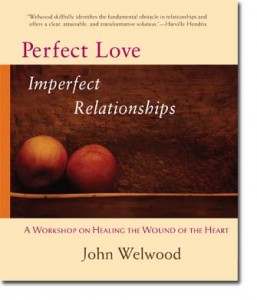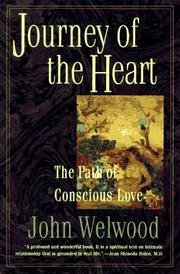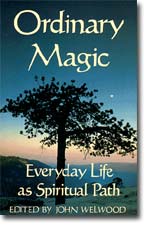 There are so many reasons to love John Welwood’s books. And what I like most about this one is that it cuts right to the core of our difficulty finding and sustaining the love we really want. When we read more conventional books about relationships, we always seem to be pointing the finger at the other, or learning how to communicate more forcefully or clearly. But those are the real solutions to finding love. In this brilliant book, John helps us to look within. To hold a mirror to our own wounds and to use that as a starting point for healing our relationships.
There are so many reasons to love John Welwood’s books. And what I like most about this one is that it cuts right to the core of our difficulty finding and sustaining the love we really want. When we read more conventional books about relationships, we always seem to be pointing the finger at the other, or learning how to communicate more forcefully or clearly. But those are the real solutions to finding love. In this brilliant book, John helps us to look within. To hold a mirror to our own wounds and to use that as a starting point for healing our relationships.
And this is why he’s known as the father of conscious relationship. He gently but persuasively invites us to go on the tougher but more fulfilling journey of learning to know and love ourselves…and then to work through the challenges of loving others.
Instead of trying to paraphrase this book for you, I suggest you read it. And in case you’re not convinced yet, feel free to read the excellent author Q&A below that will surely whet your appetite for the longer version. You can find all of John’s books on Amazon. Thankfully they are all still in print and available. This buying link is just one of many ways to connect with John’s work. He also gives workshops around the world and may even be visiting your neighborhood soon. Check his site. And stay in touch with him. I can’t wait to see what is coming next…
Q: There are many books available on relationships. How is your new book different from all the others?
This book goes to the heart of all relationship problems, in a way that no other book has. It explores “the mother of all relationship issues”: a core woundedness around love that is fairly common but rarely addressed. This book helps readers to understand this fundamental wound and to see how it affects all their relationships—not just with their partners, but also with family members, coworkers, friends. The book also guides readers through a powerful process for healing this core wound. Ultimately, this is much more than a relationships book—it’s a book about our connection to love and life itself.
Q: What is “the wound of the heart”?
Deep down most of us do not know, in our blood and bones, that we are lovable just as we are. We suffer from a “mood of unlove,” which causes us to shut down our hearts. This shutting down, and our core sense of unworthiness, becomes a lifelong wound—one that sabotages all our relationships. The wound of the heart makes it impossible for us to let love all the way in. On the one hand, we’re starving for love, and, at the same time, we tend to ward it off, even when it’s staring us in the face, because we just don’t trust it.
This wound is the source of most human tragedy and discontent. Not feeling loved or lovable, people imagine that they are insignificant, unattractive, deficient, lacking in some essential way. And all human greed, jealousy, aggression, and violence arise from there.
Q: You’ve been a couples therapist for more than two decades. In your experience, what is the most common problem in relationships?
Blaming the other person. Every relationship problem is co-created by both parties, and as long as each side insists on blaming the other, acrimony can only escalate. This is not only true between two people, but between groups of people. We see this same dynamic at work on the world stage, for instance in the problems of the Middle East. A sub-theme of my new book is how the wound of unlove operates in the world at large, in the wars and conflicts that are engulfing our planet.
Q: What inspired you to write this book now?
This book grew out of my response to the terrorist attacks of 2001 when the world felt especially fragile to me, and perilously close to collapsing into hatred and violence. After America’s political leaders embarked on a “war without end,” I felt it imperative to take a fresh look at why it’s so hard for what’s best in the human being—the warmth and goodness of the heart—to take hold in this world. My book is ultimately about strengthening our connection to love, for oneself and for the world as a whole, which seems especially important in these troubled times.

